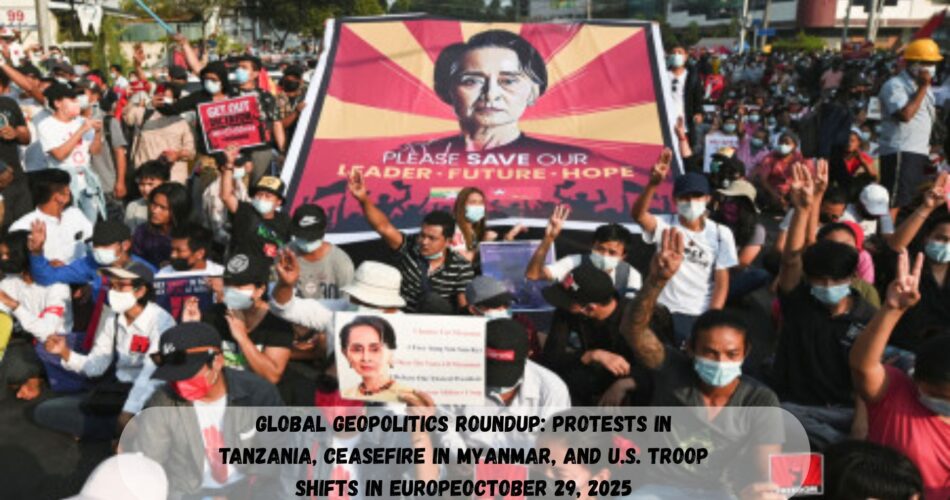Protests Erupt in Tanzania Amid Election Tensions
Protests broke out across Tanzania following allegations of harassment of opposition leaders during the country’s presidential election. Demonstrations in Dar es Salaam and other major cities turned violent, prompting authorities to impose a nighttime curfew and restrict internet access.
According to local officials, several polling stations were set on fire and vandalized, leading to a military deployment in multiple regions to restore order. The government said the curfew aims to “maintain peace and protect citizens,” while opposition groups accused security forces of using excessive force to silence dissent.
Observers say the unrest reflects growing frustration over electoral transparency and the shrinking political space in Tanzania.
China Brokers Ceasefire in Myanmar Conflict
In Myanmar, a China-mediated agreement has brought a temporary halt to months of intense fighting between the Myanmar military and the Ta’ang National Liberation Army (TNLA).
Under the deal, the TNLA agreed to return several captured towns and withdraw from others in exchange for a halt to airstrikes and military offensives. Chinese diplomats facilitated the talks amid rising regional concerns over cross-border instability and humanitarian impacts.
The ceasefire marks a rare diplomatic success for Beijing, which has sought to stabilize northern Myanmar to protect its Belt and Road investments and prevent refugee flows into Yunnan province.
U.S. to Scale Back Troops in Europe
Romania confirmed that the United States will reduce its rotational troop presence in Europe. The 2nd Infantry Brigade Combat Team, which had been stationed in the region, will return to the U.S. without replacement.
Despite the reduction, about 1,000 American troops will remain in Romania to support NATO operations. The Romanian Defense Ministry said the move “reflects a planned rotation adjustment, not a strategic withdrawal.”
The decision comes as Washington seeks to rebalance deployments amid rising security demands in Asia and the Middle East.
Heavy Fighting Continues in Ukraine’s Pokrovsk
Ukrainian President Volodymyr Zelensky confirmed that Russian forces have advanced into Pokrovsk, a key supply hub in eastern Ukraine. He said Ukrainian troops are outnumbered but continue to resist, rejecting Russian claims that the city has been fully encircled.
Military analysts say Pokrovsk’s fall could disrupt supply routes to the Donetsk front, making it one of the most critical battles in recent months.
The fighting underscores the stalled frontline and high attrition rates on both sides, even as Western support to Kyiv faces renewed political debate in Europe and the U.S.
Trump Seeks New Trade Deal with China at APEC Summit
At the APEC summit in South Korea, former U.S. President Donald Trump told business leaders he expects to finalize a “mutually beneficial” trade agreement with China ahead of his upcoming meeting with President Xi Jinping.
In a joint announcement, the U.S. and South Korea said they had agreed to reduce reciprocal tariffs from 25% to 15%, while Seoul pledged $350 billion in U.S. investments as part of the nearly completed deal.
Trump described the agreement as “almost final,” calling it a major step toward improving economic cooperation and easing trade tensions in the region.
Dutch Voters Head to Polls in Snap Election
Voting began in the Netherlands in a snap parliamentary election triggered by the collapse of the ruling coalition in June. Immigration has dominated the campaign, with far-right leader Geert Wilders and his Party for Freedom (PVV) projected to gain the most seats.
Analysts say the outcome could reshape Dutch domestic policy and influence Europe’s stance on migration and EU reform. Preliminary results are expected within 48 hours.
Summary
From civil unrest in Africa and ceasefires in Asia to troop realignments in Europe and trade diplomacy in the Pacific, the past 24 hours highlight shifting global power dynamics. As nations balance domestic pressures and international alliances, October 2025 continues to test the world’s political and economic stability.

